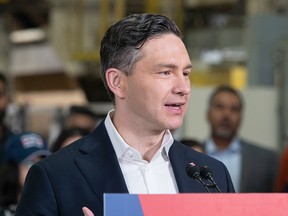Tory leader says his objective is to unite the country around his message supporting economic growth and resource development
Tory leader says his objective is to unite the country around his message supporting economic growth and resource development

KINGSTON, Ont. — Pierre Poilievre said Thursday he disagrees with calls from former Reform Party leader Preston Manning that a vote for Liberal Leader Mark Carney amounts to a “vote for Western secession.”
Manning, whom Poilievre, the federal Conservative leader, has known since his teenage years in Calgary when he become involved with the erstwhile Reform Party, penned an opinion piece in The Globe and Mail, arguing that Carney poses a threat to national unity, particularly in Western Canada, which has long been aggrieved with the policies of the Liberal government around natural resources.
Manning wrote: “Voters, particularly in central and Atlantic Canada, need to recognize that a vote for the Carney Liberals is a vote for Western secession — a vote for the breakup of Canada as we know it.”
While campaigning at a manufacturing plant in Kingston, Poilievre was asked whether he agrees with Manning’s statement.
“No, we need to unite the country,” he told reporters. “We need to bring all Canadians together in a spirit of common ground. Let’s unite our nation because after the lost Liberal decade of blocking resource jobs, driving half-a-trillion dollars out of our economy to the U.S., taxing away our workers and selling out our country, we can’t give the Liberals a fourth term in power.”
Concerns abut Canadian sovereignty have been heighted among voters as U.S. President Donald Trump had repeatedly said he wants Canada to become the “51st state.” All federal leaders have condemned the president’s statements.
Poilievre’s comments on Thursday come as he crisscrosses the country campaigning trying to unseat the incumbent Liberals when voters go to the polls April 28.
While outlining his plans for dealing with an unreliable U.S. trading partner, he has largely stuck to running a campaign centred on improving the cost of living and reducing crime in urban areas.
Successive polls still show the Conservatives behind the governing Liberals in key battlegrounds they must win if they hope to form government, such as the Greater Toronto Area in Ontario and British Columbia’s lower mainland, two regions where Poilievre has visited often.
He is set to host a rally in Oshawa later Thursday. The event he hosted in Kingston on Wednesday evening drew an estimated crowd of 4,200.
Speaking to reporters Thursday morning, Poilievre also defended his party’s vetting process for candidates, given that it has dropped four in the past 48 hours.
The latest candidate to go was Don Patel, who had been running for the Conservatives in Etobicoke North.
The party confirmed he was no longer on the ballot after it was revealed the former candidate had commented favorably on a social media post suggesting that some people should be deported to India so that Prime Minister Narendra Modi could “take care” of them.
Earlier in the week, the party also let go of Mark McKenzie, a Windsor city councillor who had been a candidate in Windsor-Tecumseh-Lakeshore. That came after it emerged he told a podcast in 2022 that he was in favour of public hangings, and named former prime minister Justin Trudeau as one of the individuals he believed should be executed, during the conversation.
Poilievre said on Thursday the Conservative party’s vetting process “is stronger than all the other parties,” which is why “we have a zero tolerance for anyone that acts unacceptably.”
He said that was in contrast to the Liberals, who did not immediately remove Paul Chiang, an incumbent for the party in Markham–Unionville, after he previously suggested to Chinese media that his Tory rival at the time, Joe Tay, could be turned over to authorities to cash in a bounty.
A resident of Hong Kong, Tay had a HK$1 million bounty (CAN$184,000) placed on him by Chinese authorities. Canada maintains the Chinese Community Party uses bounties as a form of transnational repression against its critics.
Several days after the controversary first broke, Chiang released a statement to say he would not be seeking re-election, after initially apologizing for his comments.
His departure only came after the RCMP confirmed it was looking into his remarks, which Hong Kong Watch, a pro-democracy group, said warranted a federal investigation, while more than a dozen other Hong Kong associations spoke out against Chiang’s comments.
Carney initially defended the now-former candidate, saying that Chiang had apologized for his words, calling the incident a “teachable moment.”
-30-
With files from The Canadian Press
National Post
staylor@postmedia.com
Get more deep-dive National Post political coverage and analysis in your inbox with the Political Hack newsletter, where Ottawa bureau chief Stuart Thomson and political analyst Tasha Kheiriddin get at what’s really going on behind the scenes on Parliament Hill every Wednesday and Friday, exclusively for subscribers. Sign up here.